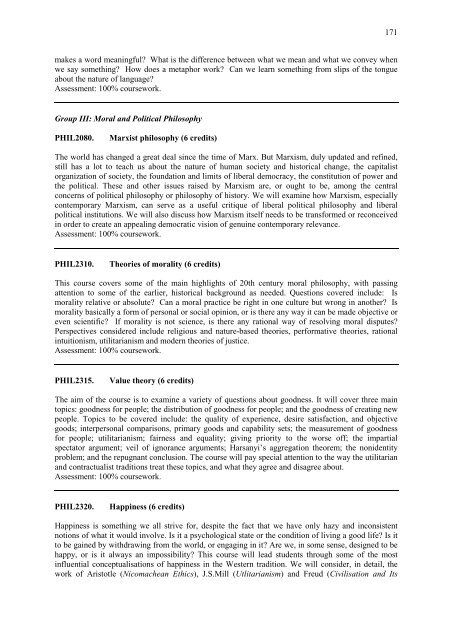(BA) (4-year-programme) - The University of Hong Kong
(BA) (4-year-programme) - The University of Hong Kong
(BA) (4-year-programme) - The University of Hong Kong
You also want an ePaper? Increase the reach of your titles
YUMPU automatically turns print PDFs into web optimized ePapers that Google loves.
171makes a word meaningful? What is the difference between what we mean and what we convey whenwe say something? How does a metaphor work? Can we learn something from slips <strong>of</strong> the tongueabout the nature <strong>of</strong> language?Assessment: 100% coursework.Group III: Moral and Political PhilosophyPHIL2080.Marxist philosophy (6 credits)<strong>The</strong> world has changed a great deal since the time <strong>of</strong> Marx. But Marxism, duly updated and refined,still has a lot to teach us about the nature <strong>of</strong> human society and historical change, the capitalistorganization <strong>of</strong> society, the foundation and limits <strong>of</strong> liberal democracy, the constitution <strong>of</strong> power andthe political. <strong>The</strong>se and other issues raised by Marxism are, or ought to be, among the centralconcerns <strong>of</strong> political philosophy or philosophy <strong>of</strong> history. We will examine how Marxism, especiallycontemporary Marxism, can serve as a useful critique <strong>of</strong> liberal political philosophy and liberalpolitical institutions. We will also discuss how Marxism itself needs to be transformed or reconceivedin order to create an appealing democratic vision <strong>of</strong> genuine contemporary relevance.Assessment: 100% coursework.PHIL2310.<strong>The</strong>ories <strong>of</strong> morality (6 credits)This course covers some <strong>of</strong> the main highlights <strong>of</strong> 20th century moral philosophy, with passingattention to some <strong>of</strong> the earlier, historical background as needed. Questions covered include: Ismorality relative or absolute? Can a moral practice be right in one culture but wrong in another? Ismorality basically a form <strong>of</strong> personal or social opinion, or is there any way it can be made objective oreven scientific? If morality is not science, is there any rational way <strong>of</strong> resolving moral disputes?Perspectives considered include religious and nature-based theories, performative theories, rationalintuitionism, utilitarianism and modern theories <strong>of</strong> justice.Assessment: 100% coursework.PHIL2315.Value theory (6 credits)<strong>The</strong> aim <strong>of</strong> the course is to examine a variety <strong>of</strong> questions about goodness. It will cover three maintopics: goodness for people; the distribution <strong>of</strong> goodness for people; and the goodness <strong>of</strong> creating newpeople. Topics to be covered include: the quality <strong>of</strong> experience, desire satisfaction, and objectivegoods; interpersonal comparisons, primary goods and capability sets; the measurement <strong>of</strong> goodnessfor people; utilitarianism; fairness and equality; giving priority to the worse <strong>of</strong>f; the impartialspectator argument; veil <strong>of</strong> ignorance arguments; Harsanyi’s aggregation theorem; the nonidentityproblem; and the repugnant conclusion. <strong>The</strong> course will pay special attention to the way the utilitarianand contractualist traditions treat these topics, and what they agree and disagree about.Assessment: 100% coursework.PHIL2320.Happiness (6 credits)Happiness is something we all strive for, despite the fact that we have only hazy and inconsistentnotions <strong>of</strong> what it would involve. Is it a psychological state or the condition <strong>of</strong> living a good life? Is itto be gained by withdrawing from the world, or engaging in it? Are we, in some sense, designed to behappy, or is it always an impossibility? This course will lead students through some <strong>of</strong> the mostinfluential conceptualisations <strong>of</strong> happiness in the Western tradition. We will consider, in detail, thework <strong>of</strong> Aristotle (Nicomachean Ethics), J.S.Mill (Utlitarianism) and Freud (Civilisation and Its
















